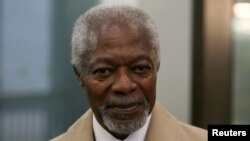Kofi Annan, the former secretary-general of the United Nations has died. He was 80 years old.
Annan's family and his foundation announced on Twitter that he "passed away peacefully," Saturday after a short illness.
The announcement on Twitter described Annan as a "global statesman and a deeply committed internationalist who fought throughout his life for a fairer and more peaceful world. During his distinguished career and leadership of the United Nations, he was an ardent champion of peace, sustainable development, human rights and the rule of law."
Current U.N. head Antonio Guterres described Annan as a "guiding force for good and said, "In many ways, Kofi Annan was the United Nations."
Born in Ghana, Annan was the first black African to head up the U.N., serving as its leader from 1997 to 2006.
He was also the first secretary-general to emerge from the ranks of the U.N. staff.
As secretary-general, Annan was instrumental in creating the Global Fund to Fight AIDS, Tuberculosis and Malaria, the adoption of the U.N.'s first -ever counter-terrorism strategy, and the acceptance by member states of the "responsibility to protect" people from genocide, war crimes, ethnic cleansing and crimes against humanity. His "global compact" initiative, launched in 1999, has become the world's largest effort to promote corporate social responsibility.
Ghanaian President Nana Akufo-Addo announced a week of mourning for "one of our greatest compatriots" and noted Annan "was an ardent believer in the capacity of the Ghanaian to chart his or her own course onto the path of progress and prosperity."
Barack Obama said Annan "was a diplomat and humanitarian who embodied the mission of the United Nations like few others." The former U.S. president added that "Long after he had broken barriers, Kofi never stopped his pursuit of a better world, and made time to motivate and inspire the next generation of leaders."
U.S. Ambassador to the U.N. Nikki Haley observed that Annan "devoted his life to making the world a more peaceful place" and "worked tirelessly to unite us and never stopped fighting for the dignity of every person."
European Union President Jean-Claude Juncker said the "greatest recognition we can give Kofi Annan is to keep his legacy and his spirit alive." Juncker added Annan "fought to end suffering and injustices across the world and helped to rebuild bridges where they had been destroyed."
In 2001, he was awarded the Nobel Peace Prize, jointly with the U.N., for humanitarian work.
U.N. High Commissioner for Human Rights Zeid Ra'ad al-Hussein said "Kofi was humanity's best example, the epitome of human decency and grace. In a world now filled with leaders who are anything but that, our loss, the world's loss becomes even more painful."
Annan joined the U.N. in 1962 as an administrative and budget officer with the World Health Organization in Geneva.
He later served in various senior U.N. posts in New York.
Immediately before becoming secretary-general, he was under-secretary-general for peacekeeping.
After leaving the U.N., he chaired The Kofi Annan Foundation and The Elders, the group founded by Nelson Mandela.





